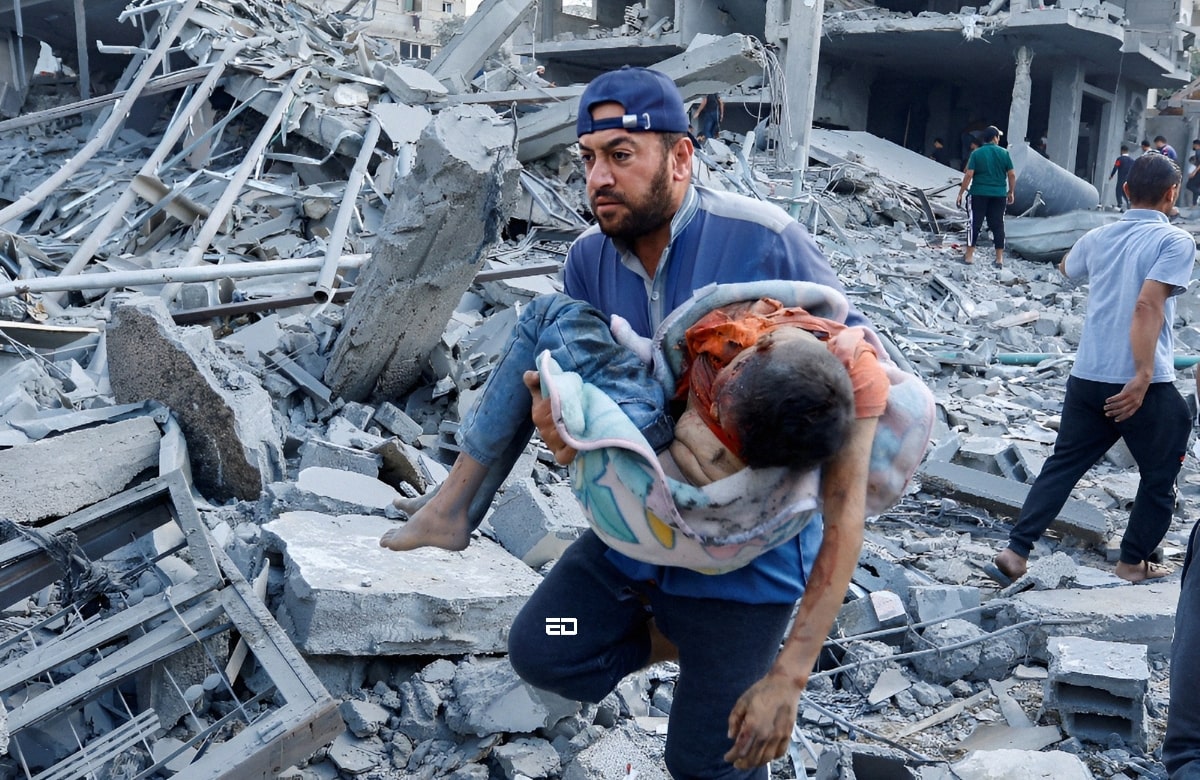The unprecedented attack by Hamas on Israel on October 7 2023, the worst on its civilians since 1948, took the lives of around 1,100 Israeli citizens. Since then, Israel has launched an attack on Palestine which has killed more than 37,000 people most of them being women and children, and left 85,000 severely injured.
Both sides have each other’s citizens hostage. Israel has vowed to not end its offensive in Gaza until it completely wipes out Hamas. However, this operation has killed more citizens than the speculated number of members in the organisation.
Here’s everything you need to know about the current situation of the ongoing war.
Is A Two-State Solution Possible?
The United Nations Security Council (UNSC) strongly supports the internationally recognised two-state solution to the conflict between Israel and Palestine. Such a solution envisions an independent State of Palestine coexisting alongside the State of Israel.
However, currently, there are many obstacles to be overcome to achieve this. A very contentious issue is establishing clearly demarcated and mutually agreed borders for a future Palestinian state.
Resolution 242 by the UNSC calls for Israel to withdraw from territories occupied in the 1967 war including the West Bank, East Jerusalem, and Gaza Strip. Yet there are now over 700,000 Jewish settlers residing there, making a full Israeli withdrawal from the region difficult.
Israel has annexed East Jerusalem which the Palestinians seek to establish as the capital of their future state. It claims sovereignty over the entire city which includes some of the holiest sites for Judaism, Christianity, and Islam.
Another problematic factor is the right of return for Palestinian refugees displaced during the 1948 Arab-Israeli war and their descendants, numbering in the millions. Moreover, Israel’s view of Hamas which is the de-facto governing authority in Gaza as a terrorist organisation further complicates the situation.
This is why prospects for meaningful negotiations between the parties appear dim at this juncture.
How Has The Israel-Palestine Conflict Further Destabilise The Middle-East Region?
Israel’s inhumane war in Gaza has triggered many countries, non-state actors and organisations in the Middle East region. It has further destabilised this region by triggering more conflicts and attacks.
The recent escalation of the Iran-Israel conflict is an example supporting this fact. Not that this conflict is a new one rather this ‘shadow war’ has its roots in the assassination of Iranian nuclear scientist Mohsen Fakhrizadeh in 2020, an attack attributed to Israel. The October 7 attack on Israeli soil was directly backed by Iran’s arming and funding of Hamas. This was how the problems between the two nations escalated again.
On April 1, 2023, an Israeli strike on Iran’s embassy complex in Damascus proved to be an unacceptable redline for Iran, prompting it to convey that Israel’s previous “free hand” to target Iranian interests and forces would no longer be tolerated without severe repercussions. And so, it launched an unprecedented missile and drone attack on Israel.
Read More: Can ICC’s Arrest Warrant Against Benjamin Netanyahu Stop Israel’s War On Gaza?
The Take Of India In The Israel-Palestine Conflict:
The United States, Europe, and Israel recognise Hamas as a ‘terrorist organisation’ but India doesn’t.
Post the October 7, 2023 attack, Prime Minister Narendra Modi declared support for Israel against the terrorist attack. The Ministry of External Affairs (MEA) also keeps referring to the attack as a terrorist attack and even the Foreign Minister, S Jaishankar agreed with the statement.
However, an important point to note here is that our MEA has not designated Hamas as a terrorist organisation.
In November 1947, a few months after India gained independence, when the partition plan was put above in the UN, India voted against partitioning the then Palestine. Prime Minister Jawaharlal Nehru had said, “India, a country that suffered lots of partitions, would not support the partition of another country.”
India did recognise the State of Israel in the early 1990s and has had excellent ties with it since then. This is further strengthened by the fact that India is the world’s largest buyer of Israeli weaponry, and Israel’s top consumer for military supplies is India which takes a share of 37% of Israeli exports.
Adding on, Israeli cooperation with Indian agriculture is helping farmers multiply their income through the adoption of modern agri-technologies to increase productivity. Haifa Port acquired by the Adani group, will be India’s largest revenue generator outside of India with nearly 99% of Israeli goods going in and out of this port.
In 2015, Pranab Mukherjee, the then President of India, visited Palestine and reaffirmed the creation of a separate state of Palestine based on the 1967 border. But in 2018, when PM Narendra Modi visited Palestine he supported the idea of separate states with no specific mention of capital and border.
On February 14, 2024, the Water Transport Workers Federation of India, which represents more than 3,500 workers at 11 major ports in India, said they will not load or unload weaponised cargoes from Israel or any other nation which carries military equipment to be taken to Palestine.
Moreover, a Hyderabad-based joint venture in which the Adani Group has a controlling stake has manufactured and dispatched over 20 military drones to the Israeli military. The sale of more than 20 Hermes drones to Israel which has not yet been publicly acknowledged by either Tel Aviv or New Delhi except for sources in Adani, communicating off the record as they are not authorised to speak to the media, had confirmed to The Wire in early February that the export had indeed taken place.
Overall, India’s stance on this issue is supporting a two-state solution that ensures the security and sovereignty of both Israel and Palestine. India has also backed Palestine’s bid for full UN membership.
Image Credits: Google Images
Feature image designed by Saudamini Seth
Sources: National Institute of Advanced Studies, Al Jazeera, The Hindu
Find the blogger: Unusha Ahmad
This post is tagged under: Water Transport Workers Federation, India, Israel, Palestine, Gaza, Rafah, war, genocide, trade unions, Palestinians, Adani Group, Hermes, drones, Israeli Defence Forces, Tel Aviv, Middle East, UNSC, resolution, conflict, Benjamin Netanyahu, Hamas, UN, membership, New Delhi, Pranab Mukherjee, Presiden, Narendra Modi, PM, Jawaharlal Nehru, independence, two state solution, partition, Haifa port, agriculture, exports, income, technology, Iran, US, Jaishankar, MEA, foreign minister
Disclaimer: We do not hold any right, or copyright over any of the images used, these have been taken from Google. In case of credits or removal, the owner may kindly mail us.
Other Recommendations:
“For The Rights Of The Palestinian People,” Congress Supports Palestine During Israel-Hamas Conflict

































